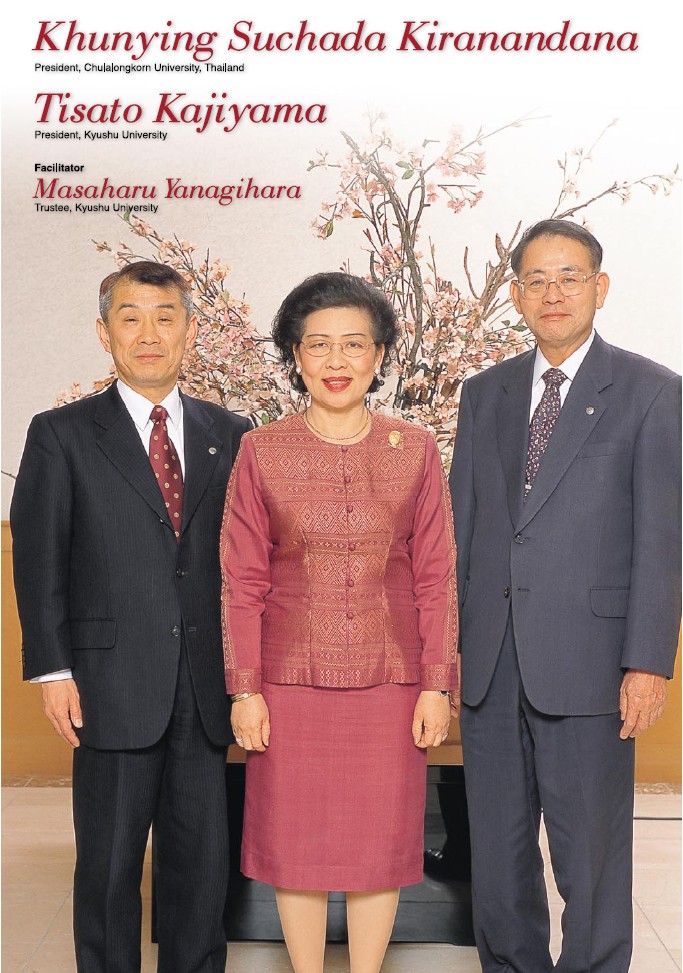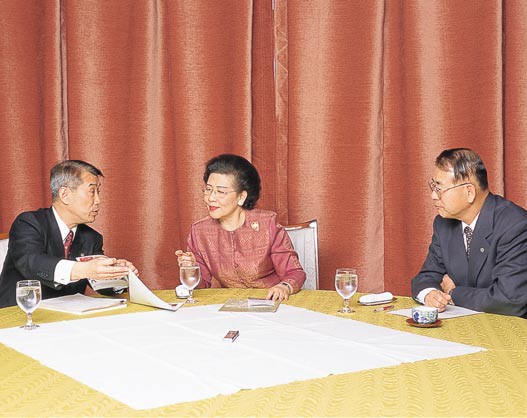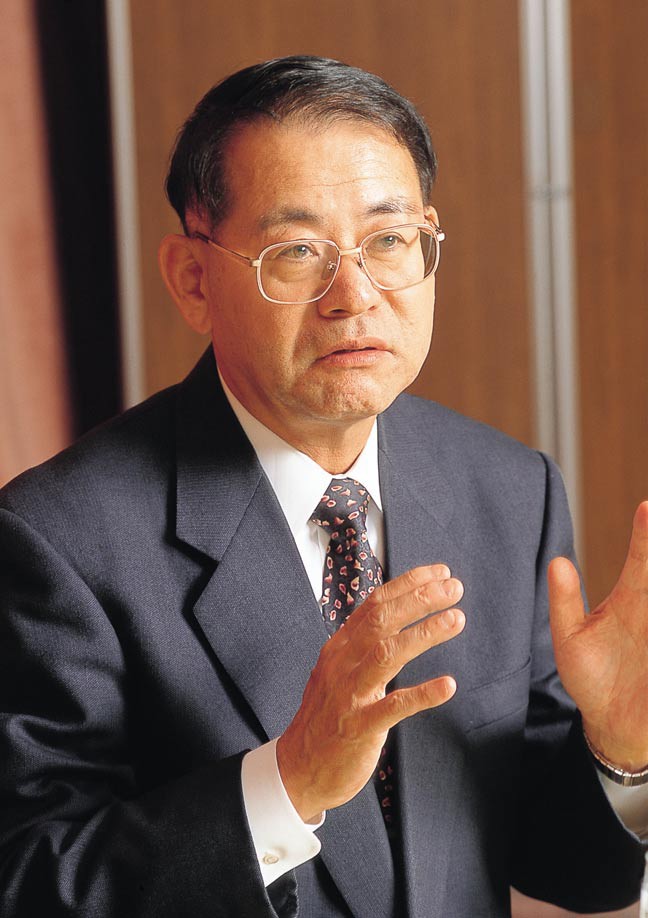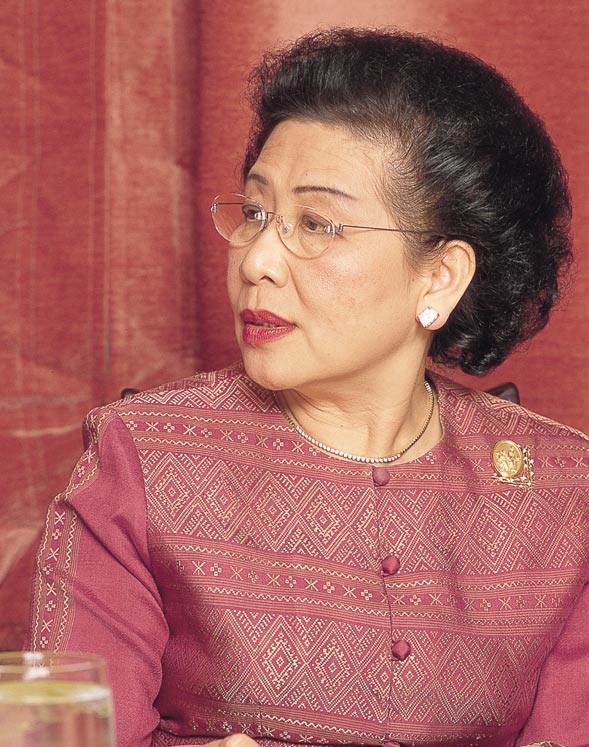Special Inter view
 |
On March 27, 2006, Khunying Suchada Kiranandana, President of Chulalongkorn University, Thailand, attended our commencement for master's and doctoral degree recipients (graduation ceremony) for the 2005 school year as a guest and delivered a congratulatory speech.
Since the conclusion of the academic exchange agreement in May 1994, Kyushu University and Chulalongkorn University have promoted various exchange activities for over 10 years. As Asia becomes increasingly important in the world, Kyushu University sets "Asia orientation" as a pillar of our future vision and the advancement of exchange with universities in Asia as our most important task. President Suchada and President Kajiyama had a discussion about the future development and possibilities of and expectations for the partnership between the two universities considering the surrounding situations.
Thai universities are facing changes
KAJIYAMA: Khunying Suchada, thank you very much for taking the time to attend the commencement at Kyushu University. I believe that your congratulatory speech encouraged our graduates enormously.
YANAGIHARA: Kyushu University and Chulalongkorn University have long developed a partnership and promoted exchange among students. In Japan, national universities were turned into independent administrative entities 2 years ago, and the situation surrounding universities has changed greatly. How is the situation in Thailand?
SUCHADA: Universities in Thailand are also facing numerous changes now. In the last several decades, autonomy of university has been called for, and there are some universities that have gone through the process of becoming autonomous, although we are moving at a much slower pace than Japan. Recently, the Thai government has proposed a change in the budget allocation policy for higher education. In the past year, many new universities have been set up in Thailand and globalization is progressing. Accordingly, older universities need to reposition to meet the challenge.
Chulalongkorn University has a mission of educating national leaders. From now on, our graduates must also be talented persons who can compete with their international peers and can work in the new world of free economy. To achieve this goal, it is necessary to provide the education that not only gives knowledge but also shows how to understand other cultures and to exercise one's ability in corporations and business environments with diversity, and we are trying to provide various opportunities and create new education methods to realize it. Cooperation with Japanese universities and other universities in China, Europe, etc. is going to be important.
At Chulalongkorn University, we aim to create our own unique curriculums. We would like to create new knowledge in multidisciplinary research in addition to the cooperation with other universities and research institutions. Also we would like our students to have the proper characteristics of the new generation graduates. To achieve this goal, we provide various programs for our students to attain basic competency not only in languages skills but also in IT, and to help them cultivate their abilities in management, interpersonal skills, abilities to work in multicultural organizations, and abilities as entrepreneurs - by providing them the opportunity to work and learn from outside the university and from diverse views and values.
For example, during the summer vacation, we offer several courses for students to learn about their fellow countrymen in the villages. After acquainting with the community, students analyze the community's issues while learning how villagers think and live. They also have a chance to offer suggestions for solving some of the problems of the villagers. We believe this will enhance our studentsf understanding of different sectors in the Thai society which will be beneficial to them in their future living and work.

Researchers' attitude changed with corporatization of national universities
YANAGIHARA: Thank you for the very interesting speech. Japanese universities, too, are going through a rapid reform since the law to turn universities into independent administrative entities passed 2 years ago. Now, Mr. Kajiyama, please talk about the reform that Kyushu University is promoting with an aim to attain the world level.
KAJIYAMA: There are pros and cons for corporatization of national universities as legislated in 2004. A pro is that faculties' attitude has changed significantly. In the past, it was enough to work within the university, and their accomplishments were for their own and not necessarily for our society's -it was like living in the so-called "ivory tower." However, since the legislation of the law, faculties have increasingly come to think, "We should return the achievements to the society and apply them for the development of new technology and science, as national universities are run at government expense." The best example is academic-industrial alliance. Universities and corporations can now work cooperatively based on a stronger sense of trust than in the past. A con is that the national budget has decreased. A largescale university such as Kyushu University can still take an advantage of corporatization even if the national budget is cut to a certain degree because the budget can now be managed more freely. However, smaller universities are financially tight from the beginning, and there is a concern that the additional budget cut may cause a great difficulty in management at some universities.
SUCHADA: In Thailand we do not corporatize public universities but call for autonomy of universities. This is so in order to attain more independence in human resource management, academic and financial affairs. There are 78 public universities and about 60 private universities. With so many new public universities, I expect the distribution of government budget will change. Actual achievements will be weighed more heavily, and both quantitative and qualitative achievements will be required. For example, universities that educate many graduates in the fields needed for development of the nation will receive larger budget allocations. In one sense, it will generate a positive effect to fuel the motivation of researchers and faculties. In any event, I believe that a budget cut to a certain degree is unavoidable for all universities.
Under such circumstances, Chulalongkorn University has started working with business and industrial sectors. This means that we will have to focus on both basic and applied research which will contribute to advancement in science and industrialization.
In this regard, Kyushu University is performing excellent work, and we have learned great examples. The disadvantage of Thailand is that our weak economy only allows a small budget for research and development. For our future, we hope to have more budget by promoting academic-industrial alliance and producing high quality results.

Partnership in Asia -one of the three poles of the world
YANAGIHARA: It was amazing that Ms. Suchada just mentioned that universities, crossing the borders, should compete and cooperate with each other at the same time. It is exactly what Kyushu University's international strategy aims at. We would like to build relationships especially with universities in Asia based on "a competitive and cooperate relationship" on a global scale which might be rephrased as "coexistence." Mr. Kajiyama, will you give an explanation on our international strategy?
KAJIYAMA: There are two pillars to Kyushu University's basic strategies. One is "development of new scientific area," and the other is "Asia orientation." We set these basic strategies five years ago, and we were one of the few that listed Asia orientation as a policy. It is necessary to compete with universities in the fully-fledged societies such as Europe and the U.S., but we believed that Kyushu University would be left behind if we did not keep pace with the high-pitched change in Asia. We therefore listed Asia orientation as our strategy.
Asia is one of the three poles and stands next to the U.S. and Europe. We should view the world at large to associate on equal terms with the U.S. and European countries that have already established the system.
For instance, I am a graduate of the Engineering Department, and the Professional Engineer qualification has become very important. This qualification system is established in the U.S. and Europe but not yet in Asia. The curriculum to acquire the qualification includes culture and religious studies in addition to science and technology. It is necessary to establish a professional engineer qualification system that is unique to and suits Asia. In this regard, too, Asia orientation is important.
Also, a recent topic that is brought up frequently is the fact that Asian people share the similar genome. This is particularly important for the development of new medicines. Today, research on "tailor-made medicine" is making advances, and it is necessary that Asian countries cooperate with each other to create medicines that suit Asian people.
Create a better world through cooperation between university people

SUCHADA: I am delighted to hear about your vision of Asian orientation. We have long looked to the West. It may have resulted in us forgetting our own issues and values. As a practical matter, Asia orientation is a vision that will be necessary in every field. This vision will let us support each other to enhance our potentials.
It is necessary for Asian universities to create a "win-win" environment in this changing world. By understanding each other, sharing and accepting different values, and cooperating with each other in addition to promoting education and research on our own, I believe, we university people can realize a better world. Politics and business are inseparable from profit. I believe that the creation of a better world through cooperation is something only we can achieve as people involved in academia.
In this sense, I would like to keep developing collaborative relations with leading universities in the world.
YANAGIHARA: You have agreed completely on the importance of cooperation between Asian universities. I hope that this opportunity will further facilitate exchange between Chulalongkorn University and Kyushu University and specific projects will proceed. Mr. Kajiyama, will you please give us a word before closing?
KAJIYAMA: We have held the "Conference of Asian University Presidents" five times since 2000. In 2003, Chulalongkorn University hosted the conference, during which the "University Network" was given birth to link Asian universities. Through this network, we hope to share various activities that are suitable for a member of the world's three poles. The sixth conference will be held at Shanghai Jiao Tong University, and I look forward to seeing Khunying Suchada there again.
YANAGIHARA: Lastly, Khunying Suchada, will you give our students a message?
SUCHADA: The world you will be in is very diverse and filled with challenges which will dynamically change. Please be grateful that you can study at Kyushu University, one of the world's best universities, polish your ability while you study at this university and prepare to fulfill your potentials. At the same time, please learn about the world and your friends in the world. I strongly hope that you and the students of my country will live and work together in a better world.
| KHUNYING SUCHADA KIRANANDANA, Ph.D. | ||
| Positions | ||
| April 1, 2004-present | President, Chulalongkorn University | |
| August 1999-March 2004 | Dean, The Graduate School, Chulalongkorn University | |
| November 1997-2000 | Member of the TOEFL Policy Council, ETS, U.S.A. | |
| May 1991-April 1999 | Dean, Faculty of Commerce and Accountancy, Chulalongkorn University. | |
| Jun 1988-present | Member of Chulalongkorn University Council | |
| Jun 1988-Jun 1989 | Chairman of the Faculty Senate of Chulalongkorn University | |
| Jun 1979-Jun 1987 | Head, Department of Statistics, Faculty of Commerce and Accountancy, Chulalongkorn University | |
| 1976-1978 | Visiting Assistant Professor, Department of Statistics, North Carolina State University, U.S.A. | |